What's new in Moosend
An overview of new features in the latest release.
The latest product news and updates to Moosend.
July 2025
Automation Triggers
We've added two new automation triggers that respond to changes in default fields.
When a specific default field value is changed - It helps with creating highly targeted automation workflows by reacting to updates in a specific default field in your recipients' profiles. By using this trigger, you can, for example, automatically move a recipient to a "Weekly Updates" mailing list if they change their Preferences from "Monthly Updates."
When any default field value is changed - This trigger helps in creating more dynamic and personalized automation workflows by reacting to updates in your recipients' default information.

April 2025
What's new?
Automation Triggers
We have added two new automation triggers to give you more control over your email campaign recipients:
When someone bounces from any list - bounces can occur when an email fails to deliver, often due to invalid email addresses or full inboxes. You can use this trigger to notify your team to initiate a review of the engaged subscribers using segmentation for future campaigns. This helps reduce the chances of getting flagged by email providers and ensures you're sending relevant content to engaged subscribers.
When someone complains - Recipients are marked as complained when a campaign is marked as spam or junk by a recipient. By using this trigger in an automation with a webhook action step, you can send the data back to your system, CRM, or any third-party service to instantly update your internal lists.
See it in Action
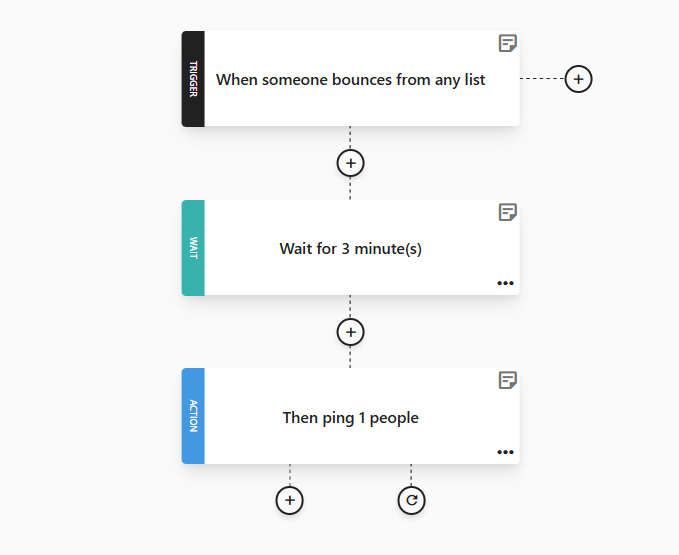
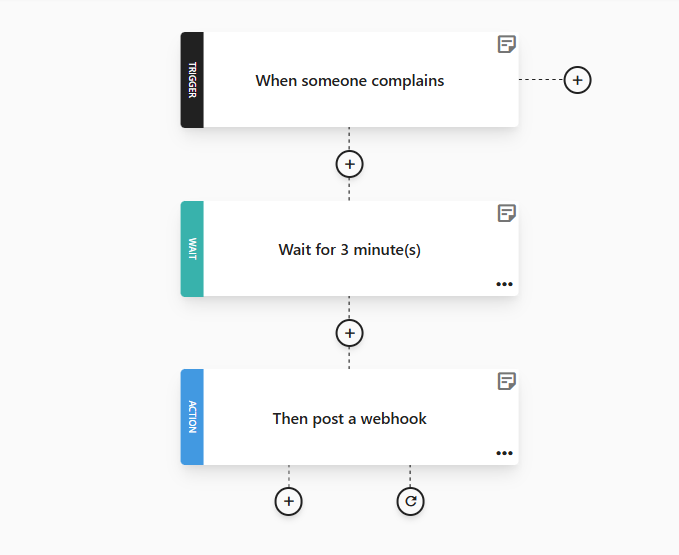
Get started!
Create a custom automation using either of our new triggers by following our steps here.
March 2025
Added Cc and Bcc for email list members for Regular campaigns
The Cc and Bcc fields feature provides a way to manage and customize the Cc and Bcc fields directly within your mailing lists, offering enhanced flexibility and control over your email campaigns.
This functionality allows you to adjust the Cc and Bcc recipients for each member, ensuring your emails reach the right audience with precision.
This feature is available upon request from our support team, ensuring you can tailor your email distribution to meet your specific needs.
To learn how to manage these fields, see our documentation here.
February 2025
Added width adjustments
When designing a campaign or a landing page, you now have the flexibility to adjust the width of the slots within the selected container. For more details click here.
November 2024
Added preference center
To personalize your marketing efforts based on user interests, we've added the preference center. You can set the preferences options for your email list, and create a preferences page where your audience can adjust the way you communicate with them.
To create your preference center there are 3 basic steps to follow:
Configure your preferences options for your email list. For more details click here.
Create a Landing page and add the preferences, by adding a Preference form item.
Add the Update Preferences Link in your campaign, so the recipients can adjust their preferences upon receiving your newsletters.
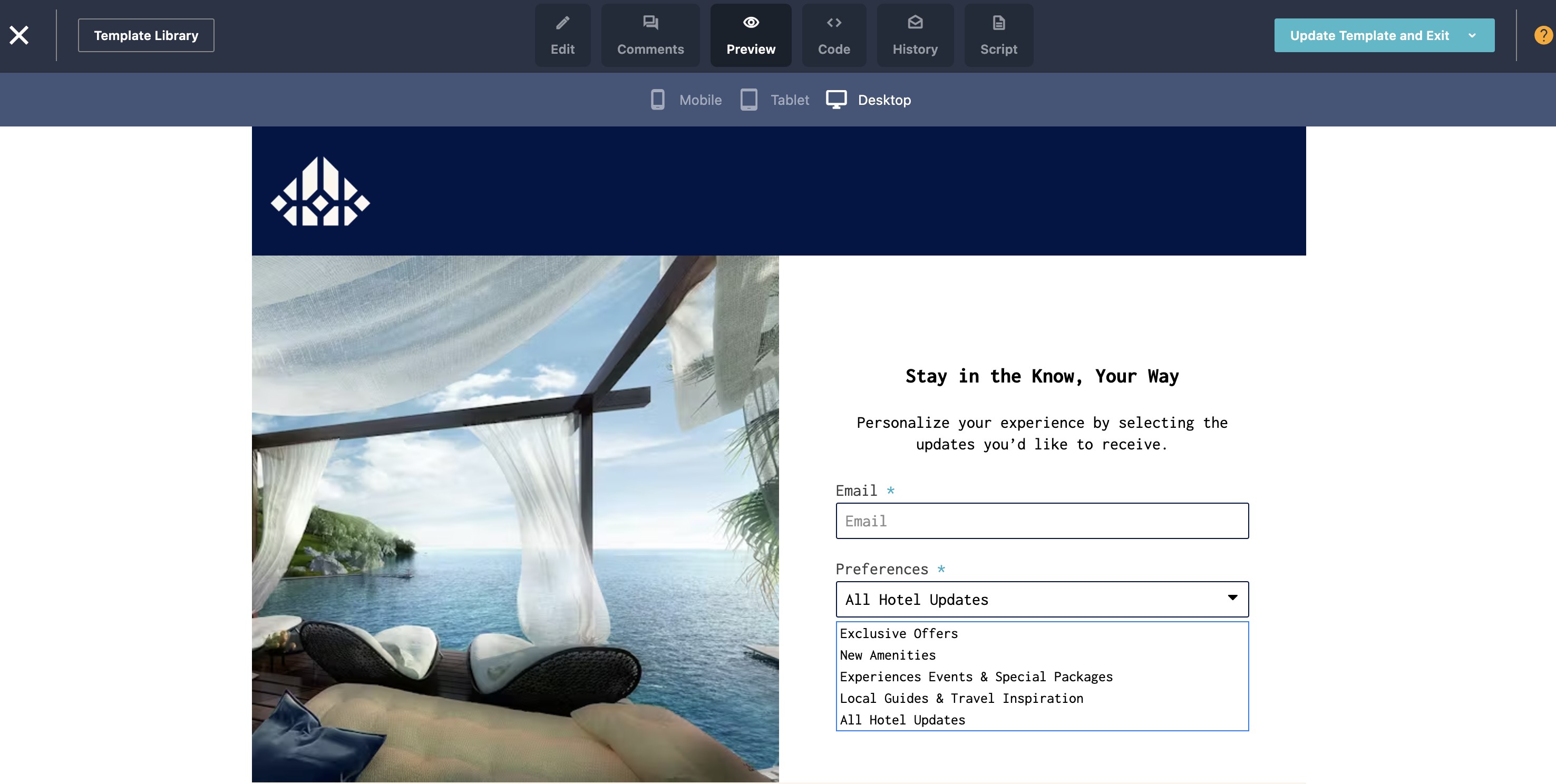
January 2024
Added DMARC sender verification to improve deliverability
To improve email sender authentication and thus prevent your campaigns from being marked as spam, we've added DMARC to the existing SPF and DKIM verification. Domain-based Message Authentication, Reporting and Conformance (DMARC) ensures the destination email systems trust messages sent from your domain and helps the receiving system decide how to handle messages from your domain that fail SPF or DKIM checks. More details are available on the Deliverability pages.
Introducing new conditions for the Conditional Visibility feature in the Campaign Editor
The conditional visibility settings let you show or hide different content based on specific conditions. You now have more conditions and comparers at your disposal. We’ve added the following conditions:
Date (is, is not, is less than, is more than)
Number (is not empty, is empty, is, is not, is less than, is more than)
Text (is, is not, is not empty, is empty, contains, does not contain, starts with, ends with)
You can find more details in the documentation Set a visibility condition.
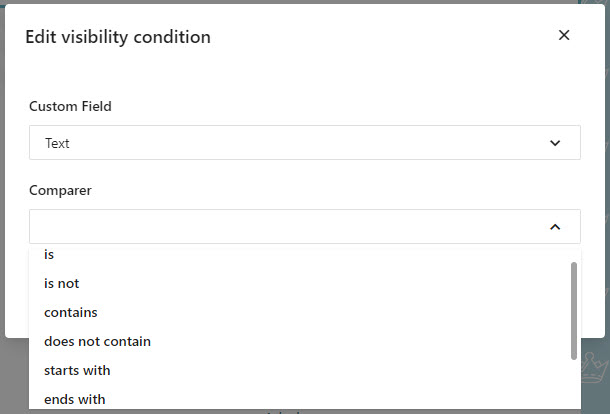
November 2023
Generative AI-enhanced text
With the power of AI-driven text suggestions, you can now enhance your email marketing campaigns by generating ready-to-use texts for your campaign subject line, preview text, and in your text items, also in landing pages and subscription forms.
You can generate the text based on keywords you enter, and you can specify the purpose of your text by choosing from the built-in options.
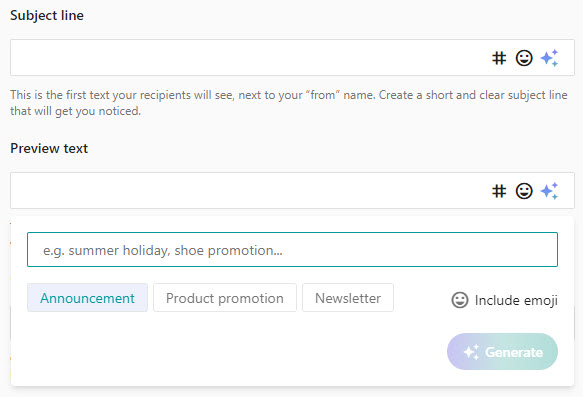
Audience discovery
You can use audience discovery to find, organize, and target different groups of customers based on their specific interests, buying intent, and where they are in the sales funnel. These insights can help you to improve the relevancy of your campaigns.
For example, you can:
Create targeted campaigns to increase conversions within a specific category
Better monitor your products’ popularity
Identify new profitable opportunities
Increase brand penetration
Target buyers loyal to your webshop with new product launches
Cross-sell or upsell to another category or within a specific category
Swap to an alternative brand within a category
With audience discovery enabled, this information is applied as colored tags on each of your email list members, allowing you to make advanced filtering using these tags as segmentation criteria.
You can create custom segments based on audience discovery tags and use this information to help manage your audience.
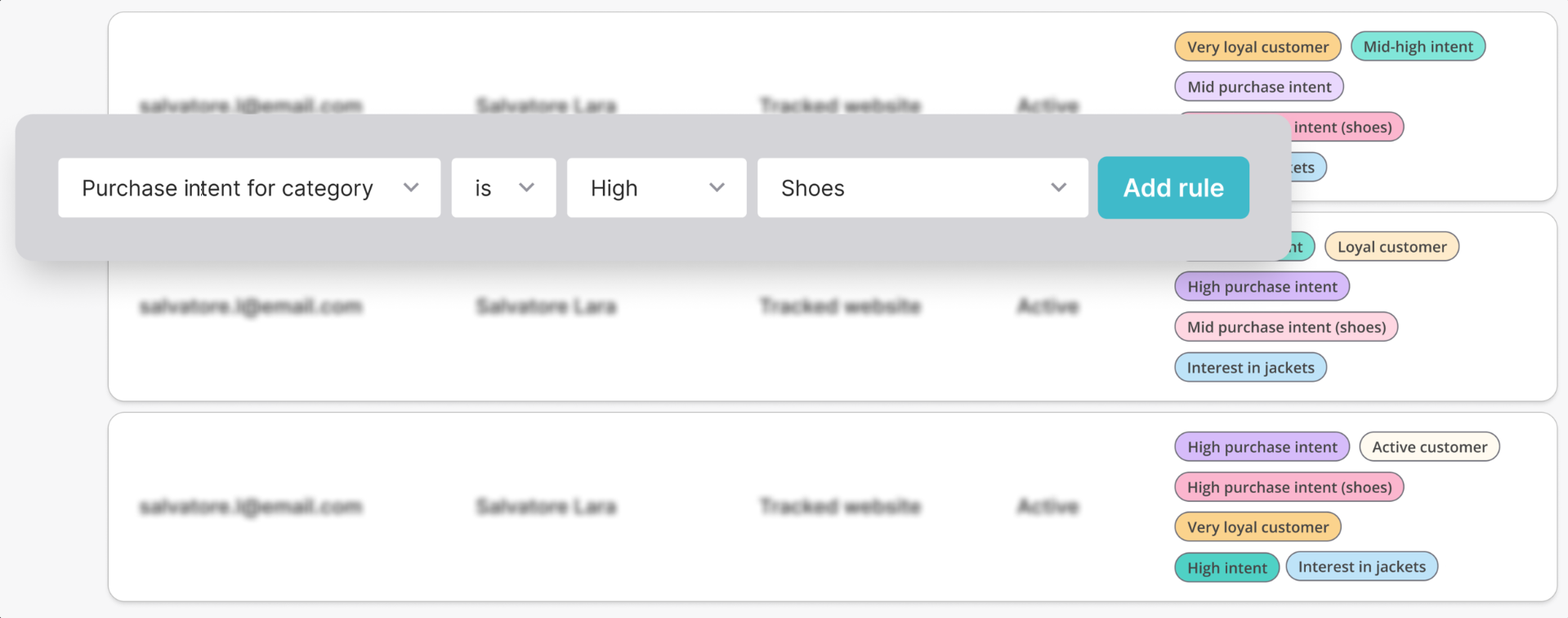
Audience discovery automations
We’ve extended audience discovery with the ability to create premade segments and campaigns, which helps you provide more personalized content to customers with high purchase intent with minimal effort. For further information, see Understanding audience discovery automations.
August 2023
Updated navigation
We've simplified and updated the header, and this means that most of the settings which used to be under your account icon  you'll now find under More in the menu bar.
you'll now find under More in the menu bar.

June 2023
Moosend user documentation
We've launched a new user documentation site for Moosend after migrating the Moosend help articles from Zendesk to Paligo, the documentation team's authoring tool. We've chosen the new site's theme and functionality to ensure that it not only delivers the information you need but also strikes a balance between the Zendesk user experience and the Sitecore style.
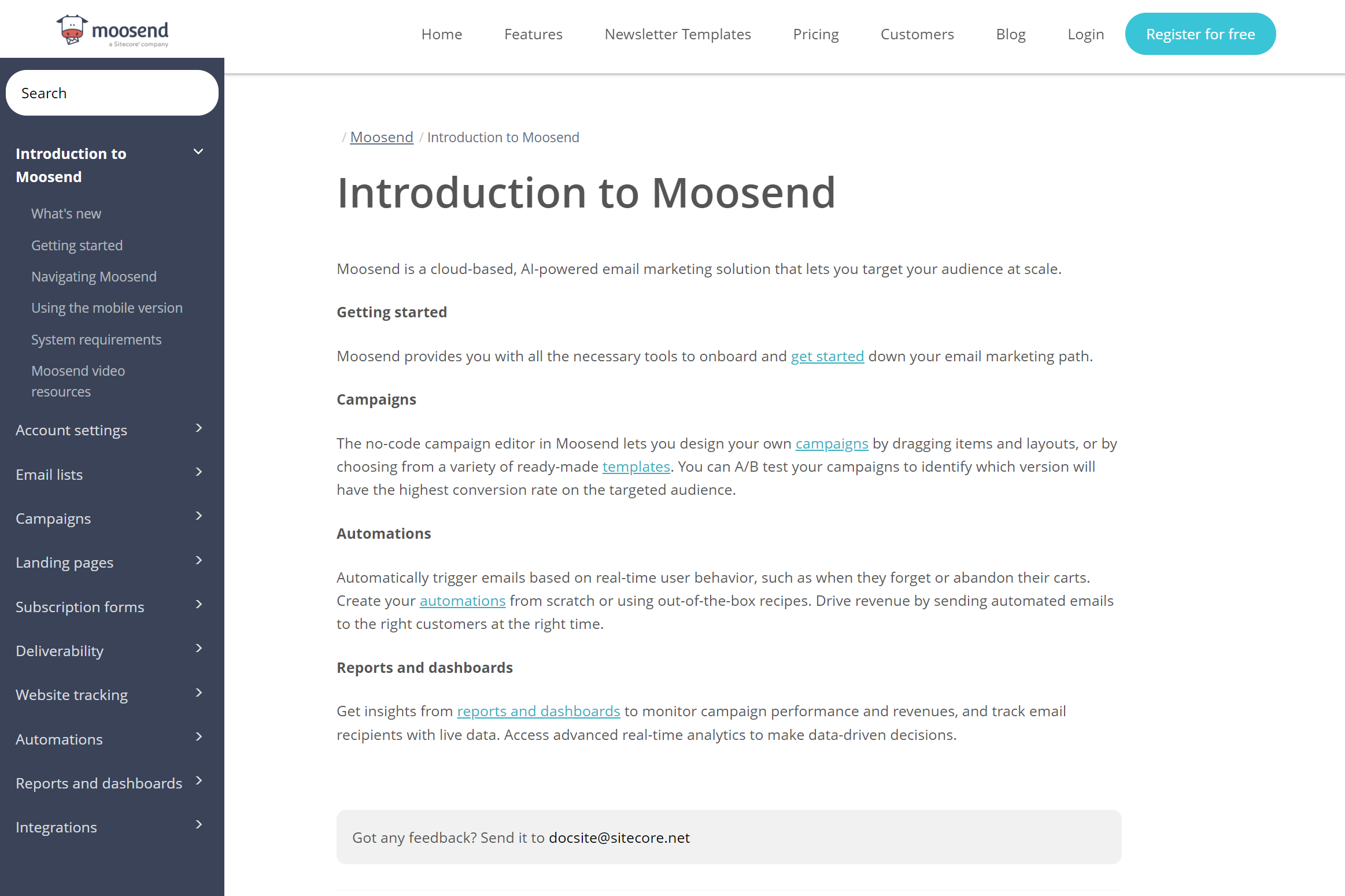
April 2023
Text editor improvements
We've moved the text editing options from the right pane of the editor into a toolbox that now appears at the top of the text item. This change makes it easier and quicker to access commonly used formatting options. You will see this change when you edit a text item, for example, in a campaign or when you add a link.

March 2023
Conditional visibility improvements
We've made user interface and functional improvements to the conditional visibility setting, which lets you send targeted content to recipients that meet specific conditions. You can now add up to 10 conditions per layout and choose whether to hide or show the content based on those conditions. By using custom fields in the conditions, you can send personalized campaigns to your recipients based on their age, location, or any other relevant data.

Mobile version
Moosend now features a mobile-friendly design, optimized to improve the user experience on mobile devices. You can access all main Moosend features, such as email lists, campaigns, growth tools, and reports, via a mobile web browser. You can also manage your account settings, send campaigns, publish landing pages and forms, view your automations and dashboards, all on the go. You can switch from your desktop to your mobile device, allowing you to resume your work exactly where you left off.


February 2023
Integration with Sitecore Content Hub DAM - The integration with Sitecore's Digital Asset Management system enables you to use your Content Hub images in your campaigns and your campaign templates.
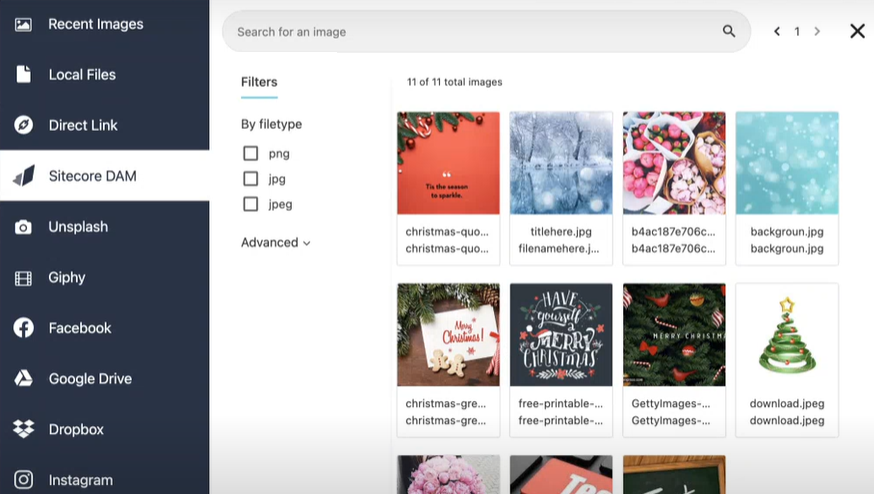
January 2023
Improved user experience - We've significantly enhanced performance in the editor so you won't experience a delay when editing large campaigns.
December 2022
API documentation
For an improved user experience, we have moved the API documentation from Apiary to a new site. The site uses a modern API tri-pane layout that lets users see simultaneously the topic outline in the left pane, the API content in the middle and the code samples in the right pane. We also use a single page structure so that users can easily navigate to and find the specific topic or endpoint they require on the same page.
The API content is divided into two distinct sections. The Getting Started section includes an overview of the API, standard API topics for onboarding API users, and a walkthrough for creating API requests. The API reference section includes a description of each endpoint and method to use, request and response parameters, and code samples in different programming languages such as, cURL, Java, Go, and Python.
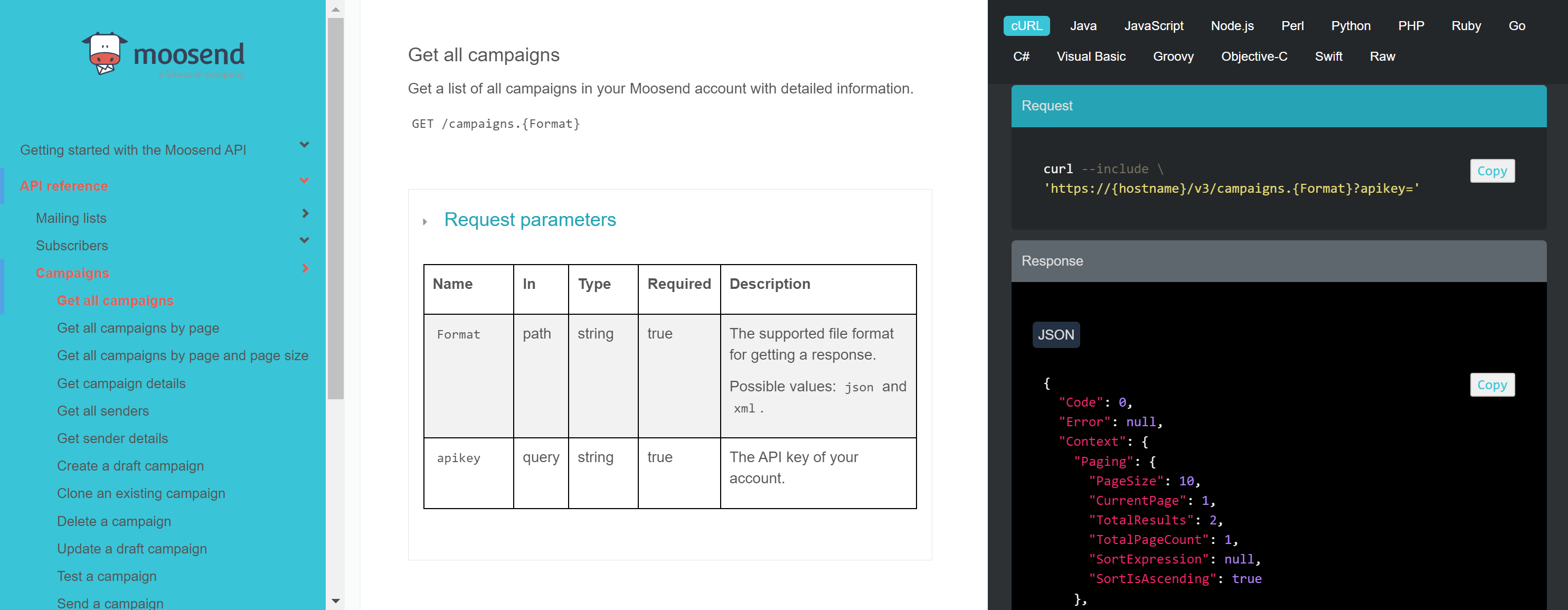
September 2022
Wheel of fortune (WOF)
You can now add a Wheel of fortune (WOF) to a form on your landing page or subscription form. By adding a WOF, your audience gets to spin a wheel in a form and win discounts or any offer you have set in exchange for subscribing to your email list.

Promotional pop-up
In addition to the different subscription forms you can create in Moosend , you can now create another type of form called promotional pop up. This type of form is used mainly to promote a special message, like a new product offer, a sale, or an event that you don't want your visitors to miss. To help you get started with the design, you can choose from the available templates.

Save custom items for reuse
The editor now allows you to save custom items in your newsletters and landing pages. Previously, you could only save custom layouts for reuse. Now, you can save any item you've created from scratch or customized, for example, a button or a timer, or any other reusable items.
Code mode in landing page and subscription form editors
The code mode has been added to the landing page and subscription form editors. Previously, you could only use code mode in the campaign editor for newsletters. This mode lets you get a read-only view of the HTML code of your landing pages and subscription forms, download the JSON files of your Moosend templates, or upload JSON files of templates from another source.
Additional editor enhancements
The editor has added more options for designing your newsletters, landing pages, and subscription forms. You can now adjust the width of your newsletter into preset sizes, select a newsletter layout's background image position, add shadow to items, set default fonts, and switch the default article image position.
June 2022
Editor redesign
To improve usability, several improvements have been made to the design of the campaign editor, landing page editor, and subscription form editor. You can see a top menu where you can access different modes and options. In the left pane of the editor, you can access layouts, items, and settings and in the right pane, you can see the layout- or item-specific settings. Additional enhancements have also been added to allow users to zoom in and out, resize the editing area, and access help articles from within the editors.

New comments mode
You can now add comments to an item or a container when you design your campaigns, landing pages, or subscription forms. Using comments mode, you can collaborate with team members by adding and replying to comments and marking them as resolved or unresolved. You are also notified as a team member when another member adds a comment to a design you're working on.
Redo option
You can now restore any actions that were undone in your newsletter, landing page, or subscription form design. (Previously, you were able to undo any action but you had to redo everything manually if you wanted to go back to the previous actions).
The redo button is placed after the undo button in the top bar.
Code mode enhancement
When you are working on your campaigns, you can now use code mode to get an actual read-only view of the HTML code of your design. This enables you to check the code of your current newsletter template before copying the HTML code and sharing it with others.